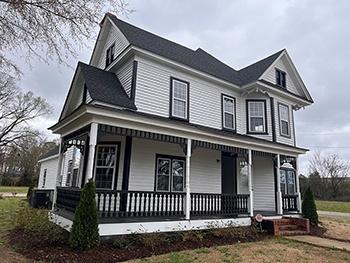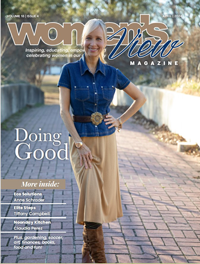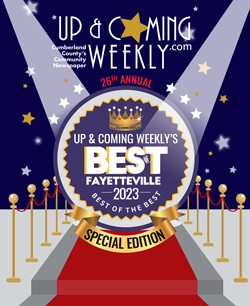
The house, built in 1902, was listed on the National Register of Historic Places in 2014. It is on Blount and Chase Streets in downtown Fayetteville, an area that was once a prominent African American neighborhood.
"A lot of people are surprised when they see the house and step foot in here. This was a man of wealth. That's not a story that is told that there were upper-middle-class, affluent African Americans. That is a Fayetteville story," said Heidi Bleazey, historic properties manager, Fayetteville History Museum.
Smith was not from a wealthy family originally. He was born on a farm in Duplin County, where his father worked. While his mother's family had been free for a couple of generations, his father was the first of his family to be emancipated. As a young black child, Smith was not allowed an education in the formal sense. After the Civil War, however, he was able to attend a school in Wilmington, where he also began his teaching career at the age of 17. Smith applied to Shaw University and graduated with a bachelor's degree in 1878. He would later return to Shaw University and receive a doctorate.
Smith became the principal of a school in Goldsboro, where he was approached with an opportunity to become the head of the Fayetteville State Normal School, now Fayetteville State University. Smith worked hard to continue to improve the school and is credited as being instrumental in obtaining the land FSU currently sits on.
In addition to his legacy within FSU, Smith's name is also used for a local high school. E. E. Smith High School produces many graduates who then continue to FSU, becoming educators themselves.
"About 90% of the high school graduates from E.E. Smith from the 50s and 60s went directly to FSU, and the majority of them are teachers," said Melinda Dancy, museum assistant.
Dancy's two daughters graduated from E.E. Smith following their father's footsteps. She said she brought them to the house to experience the man their school was named after.
"E.E. Smith alumni go really strong; they have such a sense of school pride. So it's been cool to have alumni come here and have even more meaning associated with their school pride. I think that would make E.E. Smith proud, to see how prideful his graduates are," said Catherine Linton, museum specialist.
The parlor of the E.E. Smith House will be decorated with period-appropriate furniture pieces, books and photos. Further into the house, an exhibit gallery space has been set up with panels talking about Smith's extraordinary life.
Smith served in the North Carolina National Guard through the Spanish American War. He was an ordained Baptist Minister and became president of the Baptist State Convention. In 1888, President Grover Cleveland appointed him as resident minister and general consul to the Republic of Liberia. Smith was also a businessman, heading insurance companies and real estate holdings and editor of multiple newspapers.
The museum staff were permitted to peruse FSU's archives. They found the certificate from Cleveland appointing Smith as resident minister and general consul to the Republic of Liberia and his Third North Carolina Regiment appointment letter. Copies of both will be on display for visitors to see.
"We are constantly learning about him, constantly seeing new aspects. We bought a celebratory edition of the Fayetteville Observer from 1967, and there was a little snippet about him saying that he developed a newspaper here in Fayetteville that was short-lived, and we were like, 'what didn't he do?'," said Bleazey.
This will be the second open house for the E.E. Smith property. The first one, held in February, was seen as a great success, with many older community members coming in and sharing memories of the space.
Linton mentioned how hard the community worked to rehabilitate the space, which had fallen into disrepair. She credited support from city staff, building maintenance, city custodians, grounds people and Cumberland County Parks and Recreation.
"People have really shown interest in getting back into this house, seeing it brought back to life, and becoming that gathering space and community center," said Linton.
Emma Freeman, marketing and social media manager for the museum, agreed.
"It was really cool to talk to some people at our first open house who grew up in this neighborhood. What this house symbolized for them, this was a hub for them," said Freeman. "As kids, they would come and hang on the porch and talk and play. They knew what this house stood for and who E.E. Smith was, and they loved being here."
The open house on March 25 is free and open to the public.

 How to resolve AdBlock issue?
How to resolve AdBlock issue? 









